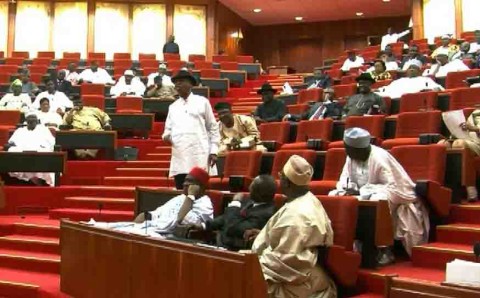Revealed – Constitution Amendment: 20 States Reject Local Government Autonomy
Featured, Latest Headlines Wednesday, February 18th, 2015
No fewer than 20 out of the entire 36 states of the federation, voted against the autonomy for local governments in the fourth amendment to the 1999 Constitution (as amended), passed by the Senate Wednesday.
The 20 states who voted against are: Akwa Ibom, Bayelsa, Borno, Cross River, Delta, Ebonyi, Ekiti, Enugu, Jigawa, Kaduna, Kano, Katsina, Kwara, Lagos, Ondo, Osun, Rivers, Taraba, Yobe and Zamfara.
States who gave the yes votes are: Adamawa, Anambra, Abia, Bauchi, Benue, Edo, Gonbe, Imo, Kebbi, Kogi, Nasarawa, Niger, Ogun, Oyo, Plateau and Sokoto states.
The proposed amendments which was rejected had stated that “a local government council not democratically elected shall not be recognised by all authorities and persons and shall not be entitled to any revenue allocation from the Federation Account or the state government.
“It shall not also exercise any function exercisable by a local government council under this Constitution or any law for the time being in force; and Shall stand dissolved at the expiration of a period of four years, commencing from the date the members of the Council were sworn in”The report also indicated that the National Assembly has also empowered the Independent National Electoral Commission to deregister political parties.
It also made provision for independent candidates in elections. The extant electoral law stipulates that candidates for elections must be sponsored by political parties.Section 177 has been altered, by inserting a new paragraph that a candidate must be sponsored by political party or he is an independent candidate.It was further observed that the lawmakers by inserted section 225A, which states that INEC can deregister political parties if there is a breach of any of the requirements for registration.
The grounds for the deregistration according to the lawmakers is if such political parties fail to win presidential, governorship of at least one state, chairmanship of at least one local government/area council or a seat in the national or state assembly election.
All the 36 states of the federation also approved the amendment.The new Constitution also stipulated the timeline within which every pre-election matter shall be filed which is not later than seven days from the date of the occurrence of the event, decision or action complained of in the suit.
Besides, the lawmakers approved that court in every pre-election matter shall deliver its judgment in writing within 180 days from the date of filing of the suit.They also requested than an appeal from a decision in a pre-election matter shall be filed within 14days from the date of delivery of the judgment appealed against; and an appeal from a decision of a court in a pre-election matter shall be heard and disposed of within 60 days from the date of filing of the appeal..
Furthermore, Section 67 has been altered by substituting for section 67(1) a new subsection “67(1)†which states that a sitting president shall attend a joint meeting of the National Assembly once a year to deliver an address in respect of the state of the nation.
The new constitution also stipulates that the president may attend any joint meeting of the National Assembly, either to deliver an address on national affairs including fiscal measures, or to make such statement on the policy of government as he considers to be of national importance.
The report further reads, “The National Assembly has also separates the office of the Attorney General of the Federation from the Justice Minister. In a similar vein, the office of the Accountant General of the Federation has been separated from the office of the Accountant General of the Federal Government.
“The Accountant General of the Federation shall be appointed by the President on the recommendation of National Economic Council, subject to confirmation by the Senate; and shall be responsible for the administration and disbursement of allocations from the Federation Account to the tiers of government.
“Both offices have a four-year non-renewable tenure. The Office of the Accountant General of the Federation shall, however, be funded from the Federation Account pursuant to an Act of the National Assembly.
“Ekweremadu had in his presentation of the report to the Senate, stayed that this would be the last time any sitting president would sign the Constitution as section 9 of the same Constitution has been amended to ensure that after such amendments have been assented to by two thirds of the country’s state houses of assembly and the two chambers of the National Assembly, such amendments become law.
Related Posts
Short URL: https://www.africanexaminer.com/?p=22292






















